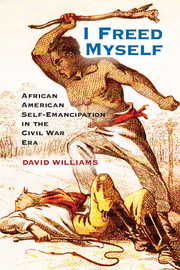4 - “Full Equality before the Law”
Claiming the Rights of Freedom
Published online by Cambridge University Press: 05 July 2014
Summary
The “Faithful Slave” Is about Played Out
As the war entered its latter phase, enslaved southerners continued taking freedom for themselves – some outright, others by degree. In the summer of 1863, an Alabama newspaper editor complained of blacks becoming “so saucy and abusive that a police force has become positively necessary as a check to their continued insolence.” In Georgia, legislators had already introduced a bill “to punish slaves and free persons of color for abusive and insulting language.” Along with freedom of speech, blacks were taking freedom of assembly as well. In Blakely, Georgia, the Early County News reported that blacks were “almost nightly running around where they have no business.” A slaveholder in Columbus, Georgia, feared that blacks were forgetting their second-class status. “It is not uncommon,” he wrote, “to see two or three in one whiskey shop.”
Although cause for concern, slaves taking small liberties were among the least of slaveholder worries. Tension between slaves and slaveholders hung over the South like a storm cloud whose lightning could strike nearly anywhere, any time. Despite their public insistence that slaves were generally content, slaveholders knew better than anyone except the slaves themselves that discontent was the norm. July 1863 found one Alabama slaveholder frankly admitting to another that “the ‘faithful slave’ is about played out.”
- Type
- Chapter
- Information
- I Freed MyselfAfrican American Self-Emancipation in the Civil War Era, pp. 161 - 207Publisher: Cambridge University PressPrint publication year: 2014



